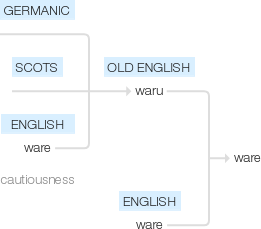Ware
Old English waru ‘commodities’, of Germanic origin, perhaps the same word as Scots ware ‘cautiousness’, and having the primary sense ‘object of care’; related to ware2.
wiktionary
From Middle English ware, war, from Old English wær, from Proto-West Germanic *war, from Proto-Germanic *waraz.
From Middle English ware, from Old English waru, from Proto-West Germanic *waru, from Proto-Germanic *warō(“attention”) as in beware, in the sense of “an object of care, a valuable”, [1] from Proto-Indo-European *wer-, whence also ward. Cognate with Dutch waar(“goods offered for sale or use”) and Swedish vara, with the same meaning.
From Middle English waren(“to be ware, be on guard, be mindful, protect, guard”), from Old English warian, from Proto-West Germanic *warōn, from Proto-Germanic *warōną. Cognate with Saterland Frisian woarje(“to guard”).
From Middle English ware, wore (as in sewor(“seaweed”), from Old English sǣwār(“seaweed”)), from Old English wār(“seaweed”), ultimately related to Proto-Germanic *wīraz; compare wire. Cognate with Dutch wier(“seaweed”), Middle Dutch wier(“seaweed”).
ware (third-person singular simple present wares, present participle waring, simple past and past participle wared)
ware
etymonline
ware (n.)
"manufactured goods, goods for sale," Old English waru "article of merchandise," also "protection, guard," hence probably originally "object of care, that which is kept in custody," from Proto-Germanic *waro (source also of Swedish vara, Danish vare, Old Frisian were, Middle Dutch were, Dutch waar, Middle High German, German ware "goods"), from PIE root *wer- (3) "perceive, watch out for."
Usually wares, except in compounds such as hardware, earthenware, etc. Lady ware was a jocular 17c. euphemism for "a woman's private parts" (but sometimes also "male sex organs"), and Middle English had ape-ware "deceptive or false ware; tricks" (mid-13c.).
ware (v.)
"to take heed of, beware," Old English warian "to guard against, beware; protect, defend," from Proto-Germanic *warō (source also of Old Frisian waria, Old Norse vara), from PIE *waro- "to guard, watch," suffixed form of root *wer- (3) "perceive, watch out for."
